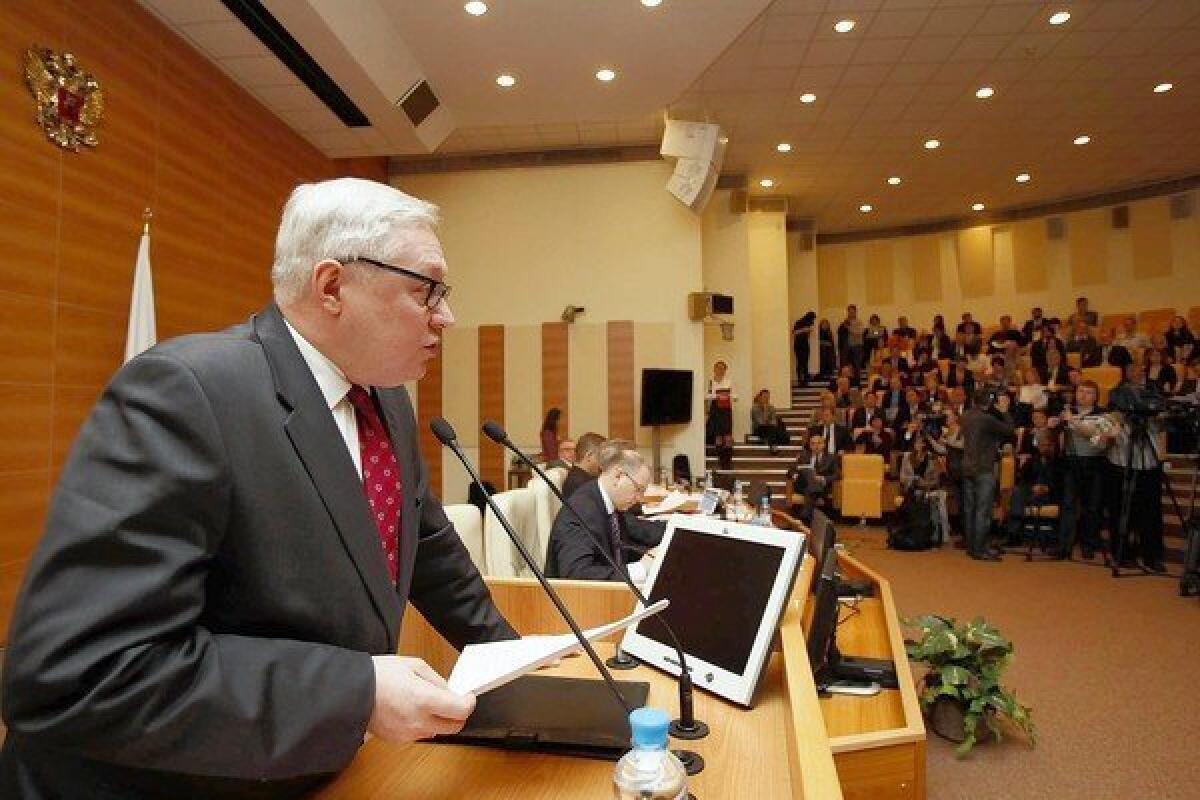Russia accuses U.S. of human rights abuses

MOSCOW â Prisoners detained without charges. Prisons operating outside the legal system. Limits on free speech and the Internet. Legitimate voters prevented from casting their ballots. Sanctioned kidnappings. Witch hunts and torture.
Itâs all part of life, says the Russian government â in the United States.
The Russian Foreign Ministry on Monday issued a 56-page report in Russian and English titled, âOn the Human Rights Situation in the United States.â
The report, distributed at hearings held by the International Affairs Committee of Russiaâs lower house of parliament, was the first such full examination of the U.S. human rights record issued here since the fall of communism in 1991. In tone, vocabulary and spirit, it was reminiscent of the Cold War-era propaganda counterattacks launched by the Soviet Union on its rival.
âI wouldnât be surprised it should feel like traveling back to the U.S.S.R.,â said young journalist Olga Kuzmenkova of the online publication Gazeta as she emerged from parliament. âI canât believe what I have just heard. I canât believe my country is moving back in time so fast.â
The tone was set by committee Chairman Alexei Pushkov, who said he and his colleagues simply did not agree âthat human rights topics should remain the prerogative of states that call themselves traditional democracies.â
âAround these [human rights] violations an information vacuum has been created and ⌠as a result we see a distorted picture of all but an exclusive right of the United States to deal with that topic,â Pushkov told the sparse audience of lawmakers, speakers, journalists and a group of political science students invited by the organizers. âOn a whole number of issues, I think Russia has a greater moral right to raise questions than our American partners as we donât have secret prisons, we do not kidnap people, we havenât had any serious scandals connected with violating international law.â
The report also portrayed the U.S. as being beset by growing social inequality and racial and religious discrimination. It says the U.S. commits human rights abuses in other countries and applies the death penalty to underage and mentally disabled offenders.
Deputy Foreign Minister Sergei Ryabkov told lawmakers that instead of conducting a dialogue among equals, U.S. officials preferred âthe language of admonition and moralizingâ and wielding the issue as âa propaganda tool.â
âHuman rights issues increasingly become a pretext for direct interference in the affairs of other countries, a tendency that raises concerns for the future of international relations,â Ryabkov said, explaining Russiaâs recent expulsion of the U.S. Agency for International Development.
Clearly on the minds of hearing organizers was the Magnitsky Act, a measure before the U.S. Congress that would impose visa restrictions and financial sanctions on Russian officials allegedly responsible in the case of lawyer Sergei Magnitsky, who was jailed after accusing authorities of corruption and died in custody in 2009. Ryabkov suggested that passage of the act would not be left âwithout a due response.â
Pavel Astakhov, a lawyer and Russiaâs envoy on childrenâs rights, offered lawmakers a blood-curdling description of several Russian disabled children adopted by American parents who he alleged were mistreated, tortured, raped and killed, with their assailants receiving only light punishment.
âThere was a time 60 years ago when Afro-Americans were beaten up, lynched and hanged ⌠and now Russian children have become an object for ill treatment,â said nationalist lawmaker Vladimir Zhirinovsky.
Another lawmaker, Alexander Romanovich of the opposition Just Russia faction, joined in the anti-America chorus and used Soviet-era language to call the arrest and prosecution of Viktor Bout, a Russian who in April was sentenced in a U.S. court to 25 years in prison on arms trading charges, âa beastly grin of American imperialism.â
Valery Garbuzov, deputy head of the Institute for U.S. and Canadian Studies, a Moscow-based think tank, emerged from the hearing dissatisfied and taken aback by the tone and content of the discussion.
âWhat we witnessed today was an obvious attempt to use the problem of human rights for political goals,â Garbuzov said in an interview, noting that the hearing failed to present âan objective picture in the context of how much is being done in the United States to safeguard human rights.â
âIt is totally wrong to paint a gruesome one-sided picture of Americans eating Russian children alive,â the analyst said.
But the rhetoric appeared to fall on some eager ears in the audience. âI am glad that Russia has grown stronger and can raise its voice about these issues, something it couldnât do before,â said Maria Vashchenko, 20, a first-year political science student from the State Academic University of Humanitarian Sciences.
The hearings and the report fit the strategy pursued by President Vladimir Putinâs government of portraying Russia as under siege, noted Lilia Shevtsova, a senior researcher with Moscow Carnegie Center.
âThe struggle for human rights is one of the ways of the old Soviet âyou are an idiot yourselfâ tactics when fighting with the West and continuing repressions against the dissent,â Shevtsova said. âThe Kremlin is dealing a preemptive strike against the Magnitsky Act and building up defenses for a coming new turn in the ongoing clampdown on the opposition.â
On Monday, opposition leader Sergei Udaltsov charged that fellow activist Leonid Razvozzhayev was kidnapped in Ukraine by Russian special services and brought to Moscow to face charges of plotting to organize mass disturbances.
A Russian official countered in televised remarks that Razvozzhayev voluntarily had given himself up and already testified against his associates.
More to Read
Sign up for Essential California
The most important California stories and recommendations in your inbox every morning.
You may occasionally receive promotional content from the Los Angeles Times.










